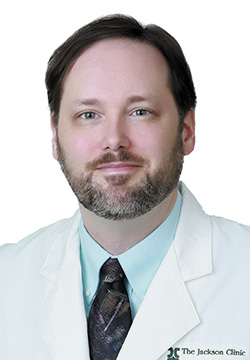By SUZANNE BOYD
Monday, November 19, 2018 12:12 pm
|
At the Jackson Clinic, Psychiatrist David Helm helps patients deal with difficult times
As a psychiatrist, David Helm, MD, often deals with people at some of the most difficult periods in their life. Being able to help them through these tough times is one of the more rewarding aspects of his job at the Jackson Clinic, PA.
The son of parents who demonstrated service to others through their jobs, Helm knew early on he would in some way pursue a path of service to others. Growing up in Bowling Green, Kentucky, Helm saw his father, a Vietnam veteran, serving and protecting the community in his role as a police officer. His mother was a career nurse whose career ultimately led her to mental health nursing at a psychiatric facility.
Helm chose to pursue an undergraduate and master's degree in biology at Western Kentucky University in Bowling Green, with the intent of going to medical school. During his time at Western Kentucky, he worked at the same psychiatric facility as his mother as a psychiatric tech where he helped patients with daily care and other needs. It was this experience that led him to consider psychiatry as a profession.
"My mother was the influence that led me to the world of healthcare, but it was my primary care physician, Dr. Leslie Lovett, who had a significant impact on why I wanted to go into medicine specifically," said Helm. "Dr. Lovett, who was also a graduate of my medical school, the University of Louisville School of Medicine, came to my home town in the 1970's to practice medicine at a time when medicine, in some ways, was still archaic. As a new breed practicing cutting edge medicine, he was instrumental in elevating the status of emergency medicine at my local hospital and as a result saved lives. He was my primary care physician up until just a few years ago when he retired. Not having him anymore as a physician felt more like losing a family member. To me this type of lasting influence is what practicing medicine is all about."
After completing his residency in psychiatry and behavioral medicine at the Brody School of Medicine at East Carolina University in Greenville, North Carolina, Helm joined the staff of West Tennessee Healthcare's Pathways as a general psychiatrist. While at Pathways, Helm gained experience by treating basically the gamut of mental health disorders. After five years there, he joined the Jackson Clinic, PA in February 2016 as the only psychiatrist on staff at the multi-specialty clinic. His practice, located at the clinic's North campus in Jackson, treats patients 18 years of age and older.
"Being the only psychiatrist at a clinic that has a large referral base, means I am busy," said Helm. "With only a few psychiatrists in the area, we are facing the same issue that much of the rest of the country faces, a dire shortage of psychiatrists with a growing need for services."
One other large barrier to care is insurance reimbursement said Helm. "It is a vicious cycle, insurance seems to have a tough time reimbursing for psychiatric services, so it is hard for patients to seek care and it makes it harder for a psychiatrist to be able to see patients if their insurance does not cover these services," he said. "Compounding the problem is that often times people with severe mental illnesses are unable to work and thereby may not have access to insurance to help them get services. The stigma of mental health can still be a very difficult hurdle to overcome."
Anxiety and depression tend to lead the list of disorders Helm sees in his practice. "By nature, it is the most prevalent disorder you would see anywhere," he said. "I think most everyone will have to deal with anxiety or depression at some point in their life. But really they are no different than someone who has hypertension or any illness, it has to be treated. While the causes can range from a genetic chemical imbalance to a life crisis such as divorce or death, most disorders are life-long, therefore much like in family medicine, some patients I will see long-term."
Treatment can include a combination of psychotropic medication management and therapy. "Most importantly is being there for them in difficult times," said Helm. "Medications don't fix everything. Adding therapy can give the patient the best chance to get better. Having that time to talk to a patient can help to develop trust and a relationship that can be important to identify and deal with the issues."
As with other areas of medicine, psychiatry is looking at genetic testing and advancements in medications to improve treatment of patients. "While many are still in experimental phases, we are seeing great promise in new medications for depression and mood stabilizers for bipolar disorder," said Helm. "Knowledge of medications is growing exponentially and advances in genetic testing will help to determine which medications may be more effective for a patient."
Being able to provide psychiatric services in a rural health setting is very important to Helm and was one of the big reasons he was attracted to Jackson. "I have dedicated my life to medicine," he said. "And my main objective is to help as many people as I can."
